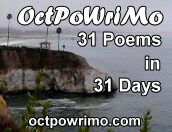Mind of a Mage … (Ghazal)
In the off-wings behind her veiled blind of a mage –
She’s not young, her gray hairs remind me of a mage …
Languid eyes, rosy cheeks and a solemn stare –
She hides behind the twisted mind of a mage …
More like a wizard than a witch … devious is she
Weaving words complacently – with her mind of a mage …
Always right, or so she thinks, she drives me mad!
Proud and austere – devious mind of a mage …
Ah women – bedeviled creatures one and all,
Beware friend, of their serpent mind of a mage …
I her man, am trapped in her spider’s web …
She’s bewitching – with her mind of a mage.
(c) G.s.k. ’14
This was inspired by Ye Olde Foole … he’s been better known for his haiku and tanka, but is an all around great poet … and writes in many forms including sonnets and ghazal … I read a couple of his ghazal yesterday and he sent me one written by Robert Bly. Then this morning I saw a new ghazal on Fool’s Blog and decided to write Mindlovesmisery’s Self Portrait prompt (whereby you look at yourself through the eyes of another) using a ghazal … hope you’ll drop by and enjoy both of them!
Here is how you write a ghazal:
1. Every verse is a 2-line couplet, (unless your Robert Bly) with around 4 to 10 couplets in total.
2. Each line must contain the same number of syllables.
3. Every verse ends in the same word(s) preceded by a rhyme.
The same repeating word(s) is/are called a radif, and the rhyme is called a qaafiya.
4. In the first couplet, both lines end with a qaafiya (rhyme) and radif (repeating word(s)).
5. Each verse is considered a separate mini-poem, so there is no need for any connection between couplets.
6. The last verse is traditionally a signature couplet in which you include your first or last name (or nickname).



Oh wow fantastic Georgia, The form works perfectly for this and I love the line you have chosen for repetition!
LikeLike
Thanks Yves … I really want to go and revisit some of the classical forms again … love free verse and haiku, but one gets sort of pigeon-holed after a while … need to do some prose too. Just need the time!
LikeLiked by 1 person
I write mostly free verse, I do love haiku, tanka, shadorma but I don’t have much experience with forms in general. I am terrible with meter and rhyming! Of the rhyming forms I like Quatrains and Villanelles (though I haven’t had much success with them personally). You are excellent with forms Georgia and I was going to ask you if you wanted to open the Shadorma prompt and make it more of a practicing with different forms sort of prompt? Anmol will still be doing tanka/haiku but you will still have a huge variety of poetical forms at your disposal. If you do this we can create a page that has the rules for various forms and you can add to it each time your introduce a new one
LikeLike
Wow Yves, first of all I started doing forms last year and I found that at first they really baffled me, usually because the explanations were way technical and I didn’t have the background to figure out the explanations. I met a wonderful poet, who unfortunately, is no longer blogging, who had a wonderful way of explaining forms, she really helped me get into them. I also read a great book by the comic Stephen Fry … The Ode Less Travelled, though I still count syllables with my fingers instead of tapping meter 😉
I’d really love to open the shadorma up to different forms of poetry … and maybe every once in a while have a guest author, like Jen from Blog it or Lose it who comes up with some of the greatest forms I’ve ever tried.
The opening of a rules page sounds cool too .. we’ll wind up with a reference blog for poetry as well as great prompts … I’m game to try!
that sounds like fun actually – I’ve been showing a few “little ones” but didn’t want to get off theme too much.
LikeLiked by 1 person
That sounds great to me, we can invite Jen as an author to MLMM if she wants to join and she can help you with the forms and make posts herself. You are doing an amazing job you are a natural! I use the dictionary for syllables lol I also sent you an email you can dismiss the first paragraph because we just decided but the other 2 are still relevant lol
LikeLike
Ok … will read it asap … then get back to you a little later.
LikeLike
I reckon Stephen Fry owes me a fortune in commission for every time I’ve recommended the Ode Less Travelled to fellow-students and blogging friends.
I love the discipline that form imposes, and have to re-iterate that counting syllables on your fingers doesn’t produce the same effect as working with meter. In a stressed language like English, not every syllable has the same stress, and can completely upset the rhythm of a line.
LikeLike
I do agree on both counts Viv … you should be getting a commission and of course, meter is better than fingers … though it’s a hard habit to get out of ,,, I do often try to re-read my poems and listen for the da da da di da da da – except for haiku et al 😉
LikeLike
Hey, this is an interesting form, and love your choice of repeating line – very powerful… I like that image too, very mysterious….
LikeLike
Thanks … wish I’d done that photo image … really cool! The form is interesting and once you’ve done it, it’s not hard to do. The ghazal is a traditional Persian form of poetry.
LikeLike
Must give it a go!
LikeLike
Please do, love to see how it comes out, so if you do pls ping me.
LikeLike
Or comment here with your link.
LikeLike
Well, I’m very impressed!
It’s not often that one writes of older women being compelling. I’m so happy to see it, and the poem is magical!
http://poetryofthenetherworld.blogspot.com/2014/10/octpowrimo-2014-day-15.html
LikeLike
Thanks Sally … as the older woman is “moi” as seen through the imagined eyes of my hubby …. 😉
LikeLike
This is brilliant Georgia. Never knew Ghazals could be written in English.Learnt something new today 🙂
LikeLike
I think that now days we can write just about anything in English … though they’re never quite the same as they are in the original language. Thanks for dropping in and making such a lovely comment. I’m happy you felt you learnt something 🙂
LikeLike
Thanks for that delicious word “mage.” I’ve known about “magus” for a long time, but not “mage.” Delightful!
LikeLike
Hm … my son has played D&D since he was 13, sometimes involving me whenhe didn’t have anyone on hand 😀
LikeLike
I love the repetition here. Absolutely stunning.
LikeLike
One of the thing I like about the Ghazal … Glad you enjoyed it.
LikeLike
We are all captivated by something or someone and you’ve woven a fine web indeed.
Thanks for your friendship!
I think I’ve heard of this form. But when they get a tad to complex I tend to …run for the hills.
And I think it is a great idea to have a forms page and to introduce new forms. I have a forms page on my Gems blog. Though there aren’t that many that I’m sure you haven’t already heard of.
http://julesgemstonepages.wordpress.com/poetry-forms-old-and-new/
LikeLike
Thank you for your friedship too!
Looked at your page, that was a smart idea… good for you btw — I bookmarked it, nice to have easy reference.
LikeLike
🙂 Please also be free to use any of the examples.
Though I am sure you can also create your own.
LikeLiked by 1 person
I was thinking of using examples by grat authors like Eliot or Thomas etc. 🙂
LikeLike
I’m not sure if they have some of the newest forms 😉
I am sure though that whatever you post will be a delightful challenge and a wonderful learning opportunity.
LikeLike
I’m not sure either … hope other people will think the same and hope they’ll have fun too!
LikeLike
Bookmarking this! A new poetic form!
LikeLike
And a lovely one it is!
LikeLike
This is such a fascinating form to use – and well, of course, being a non-poet – I still get to learn something new.
The repetition is wonderful – and in reply to the prompt – it works so well. The point of view is excellent – and I think the repetition just adds to the wonder and mystery of a man trying to demystify the woman in his life.
Great job 😀
LikeLike
Thanks so much Pat … I’m happy you find something in my posts even if you’re a non-poet 😉 I think it’s interesting to know something of the forms to appreciate a poem and from whence it came … a great critique btw appreciate it!
LikeLiked by 1 person
I find using most formal forms difficult but admire those who do them so well… this was stirring… It was all in the repetition for me… thanks for the tutorial at the end as well… I love that stuff.
LikeLike
It is difficult to get started using forms, which I’ve only been doing just a little over a year . but I’ve found them to be stimulating … the repetitions are essential in this form and in many others .. makes writing them easier too 😉 — thanks for dropping by and I’m glad you enjoyed the poem!
LikeLike
Gorgeous — I am so envious of your skill in ghazal! And thanks for pointing us to Old Foole’s ghazal -also very lovely and striking.
Off to find Stephen Fry’s book now ….
LikeLike
Ach … and for Ford (whatever it’s called 😉 ) when you write one of those I shudder with vicarious horror at how difficult it is to write! And love every word btw. Glad you found Old Foole .. he’s my hero!
LikeLiked by 1 person
We talked about discipline driving a person on to greater things, and I mentioned that’s sort of how I felt about the fornyrdislag. He wanted info on the fornyrdislag then — so — perhaps we’ll read fornyrdislag via Old Foole some day? And if he writes like this all the time it’ll be amazing.
LikeLike
He is an amazing poet .. has written for over 30 years … and until recently on his blog we read mostly haku, senryu and tanka … he started by writing songs though … if he writes a fornydislag it will be formidable!
LikeLike
it sure will!
LikeLiked by 1 person
Pingback: B&P’s Shadorma and Beyond – Ghazal – April 4, 2015 | Mindlovemisery's Menagerie